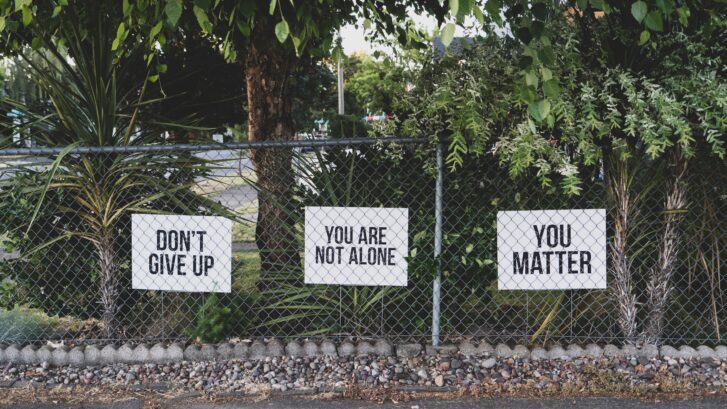Mental Health Still a Pandemic Challenge
It’s no surprise that mental health issues have soared due to pandemic stress in recent months. Between the loneliness resulting from the pandemic isolation to worrying about us or our loved ones contracting COVID-19 to financial concerns, people are suffering.
One survey by the CDC found 40 percent of respondents were experiencing mental health issues. These mental health issues reportedly arose from the pandemic, anxiety about the coronavirus itself and the containment measures related to it.
Our concierge doctors have seen this first hand from our patients, as well. In fact, it would be surprising if everyone wasn’t feeling stress to some degree. Especially if you consider all the stressors our nation has experienced over the last few months.
You’re not alone
The CDC survey, along with others, shows that mental health concerns are widespread.
The survey found that of those who responded to the online survey:
- 31 percent said they’d experienced symptoms of anxiety or depression
- 26 percent said they’d experienced trauma or stressor-related disorder symptoms
- 13 percent said they’d started or increased substance use
- 11 percent said they’d seriously considered suicide in the last 30 days
A new study in the journal The Lancet found the quarantines are linked with post-traumatic stress disorder (PTSD) symptoms, confusion, and anger. And some research is suggesting that these symptoms may be long lasting.
The Culprit: The Pandemic
One article published last fall in the Journal of the American Medical Association (JAMA) cautioned that a wave of lingering substance abuse and mental health disorders could be building as a result of the pandemic.
“This magnitude of death over a short period of time is an international tragedy on a historic scale,” the authors wrote. “This interpersonal loss is compounded by societal disruption.”
They particularly warned of “the transformation of normal grief and distress into prolonged grief and major depressive disorder and symptoms of post-traumatic health disorder.”
Lisa Carlson, the immediate past president of the American Public Health Association, told CNN last month, “The physical aspects of the pandemic are really visible. We have supply shortages and economic stress, fear of illness, all of our disrupted routines, [and] there’s a real grief in all of that.”
Carlson, who is also an executive administrator at the Emory University School of Medicine in Atlanta, added, “We don’t have a vaccine for our mental health like we do for our physical health. So it will take longer to come out of those challenges.”
How to cope
The CDC reminds Americans that, although “public health actions such as social distancing can make people feel isolated and lonely and can increase stress and anxiety, such actions are necessary to reduce the spread of COVID-19.”
And remember, the vaccines are on the way!
Meanwhile, here are some coping strategies, and places to turn to for help.
Knowledge can help alleviate stress. So know what to do if you become sick, and call us if you think you’ve contracted the virus. And learn the facts about COVID-19 from reputable organizations, not from social media or questionable sources.
Know where and how to get treatment and other support services and resources. This includes counseling and therapy, either in person or through telehealth services.
Take care of your emotional health. Caring for your emotional health will help you think clearly and better equip you to care for yourself and your family.
Take breaks from watching, reading, or listening to news stories, including those on social media. Hearing about the pandemic repeatedly can be upsetting.
Take care of your body:
- Take deep breaths, stretch, or mediate.
- Try to eat healthy, well-balanced meals.
- Exercise regularly.
- Get plenty of sleep.
- Get outdoors as often as possible.
- Avoid excessive alcohol and drug use.
Make time to unwind. Try to do some activities you enjoy.
Connect with others. Talk with people you trust about your concerns and how you are feeling.
Connect with your community- or faith-based organizations online, through social media, by phone or by mail.
Get immediate help in a crisis:
- Call 911.
- National Suicide Prevention Lifeline: 1-800-273-TALK (8255) for English, 1-888-628-9454 for Spanish, or Lifeline Crisis Chat
- National Domestic Violence Hotline: 1-800-799-7233, or text LOVEIS to 22522
- Disaster Distress Helpline: Call or text 1-800-985-5990 (press 2 for Spanish)
- National Child Abuse Hotline: 1-800-4AChild (1-800-422-4453) or text 1-800-422-4453
- National Sexual Assault Hotline: 1-800-656-HOPE (4673) or online chat
- The Eldercare Locator: 1-800-677-1116
- Veteran’s Crisis Line: 1-800-273-TALK (8255) or text: 8388255 or Crisis Chat
To find a health care provider or treatment for substance use disorder and mental health:
- Substance Abuse and Mental Health Services Administration (SAMHSA): 1-800-HELP (4357)
Be sure to call us if stress gets in the way of your daily activities for several days in a row. We can help.

